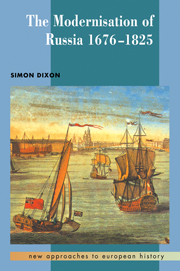Preface
Published online by Cambridge University Press: 05 June 2012
Summary
With the exception of peasant revolts and aspects of the reign of Peter the Great, the eighteenth century fared poorly in the hands of Soviet historians, to whom it seemed suspect as a time of foreign influence in Russian affairs. Following the fall of the USSR, the prospects have become more encouraging. Though there remains much about which we know nothing – an ignorance I have made no attempt to conceal-multi-national scholarship over the last generation or so, much of it in Russian archives, has allowed us to answer familiar questions in a fresh or better-documented way. In turn, such work has suggested new questions to ask of well-known evidence. This book attempts to draw the threads together in coherent and accessible form.
Though flashes of originality may be detected in my arguments, a book of this kind naturally draws heavily on the researches of others. I should like to have been able to acknowledge each debt individually. But whilst authors experience a frisson of conceit to see their reading recorded in copious footnotes (where its limits may be exposed), many readers merely shudder at the sight of such a cumbersome apparatus. Following the pattern of the series, I have kept references to a minimum: they identify quotations and mention works that might otherwise have escaped the bibliographical notes.
- Type
- Chapter
- Information
- The Modernisation of Russia, 1676–1825 , pp. xi - xiiPublisher: Cambridge University PressPrint publication year: 1999

